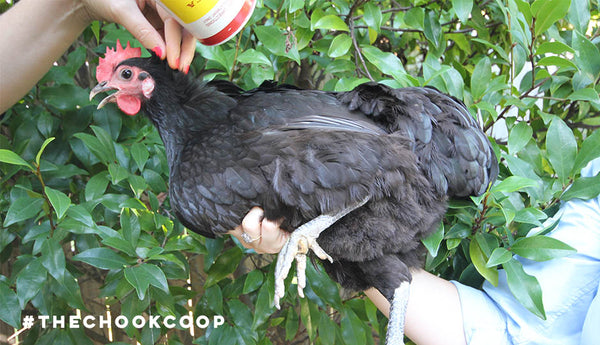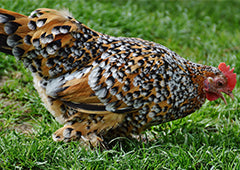As backyard chicken keepers, you probably get absolutely giddy at the thought of waking each morning and visiting your chatty flock as they welcome you into their feathery world. Nothing beats that very first visit of the day! Once you’ve completed all of your chicken tending chores and your fine feathered friends are happily foraging and egg-sploring, this is a great time to take stock of your flock. Spending time with your flock each morning when they are bright eyed and bushy tailed from a good night’s rest should give you a pretty good picture of their overall health and well-being. And, one of the most important signs of healthy happy chickens is in their droppings. Yes, you read that correctly- droppings.
The Scoop is in the Poop
Healthy happy chickens have healthy droppings. It’s always helpful for backyard chicken keepers to know what healthy droppings look like in order for you to recognize abnormal droppings, which has lead me to my little saying that “the scoop is in the poop”. Normal chicken droppings appear in two different forms. Typical droppings are generally firm and brownish in colour with a small white cap on top. That’s simple enough to recognize, right? However, chickens also have a second type of normal droppings that come from a part of their digestive system known as the ceca. The ceca is located in between a chicken’s small intestine and large intestine. Bacteria in the ceca help to break down undigested food passing through the intestines. And, several times each day, a chicken will “drop” cecal droppings. Due to their consistency and unpleasant smell, these droppings can appear abnormal, but I reassure you, they are completely normal. Cecal droppings are reddish brown in colour and have a sticky consistency. Any droppings other than these are considered abnormal and warrant a closer examination of your flock.
Diarrhoea is always abnormal. Fortunately though, diarrhoea can be just a simple side effect of your chooks drinking an overabundance of water in extreme heat or the result of overindulgence- too many worms. Or, it can be a signal to you that something is very wrong! You just have to be able to account for what is causing this abnormality in your precious poultry’s poop.
What Causes Diarrhoea in Backyard Chicken Flocks?
As mentioned previously, diarrhoea can be an annoying side effect from a chicken’s everyday routine. Besides drinking egg-cess water in hot weather and devouring too many worms, diarrhoea can also be a result of stress within the flock: the addition of new feathery siblings, a change in the pecking order , moving into a new coop, egg-cessive treats, or drinking stale or dirty water. If there’s something that we backyard chicken keepers know well, it’s that our chooks are perky peckin’ prodigies and those little beaks often get into all sorts of things that can really pollute their water. Also, if one or more chickens have been on antibiotics, this too can cause droppings to appear looser than normal.
Diarrhoea can also be caused by illness or other unhealthy conditions:
Inappropriate Feed: Chicken feed that contains too much protein can cause watery droppings. The excess protein changes into urates, thus causing diarrhoea-like droppings.
Worms: if large numbers of worms are present, a chicken’s digestive system can become irritated, resulting in diarrhoea.
Coccidiosis: this is a serious disease which typically results in bloody diarrhoea or greenish loose droppings in younger poultry. Very severe cases can cause death, so if you suspect your chooks may have developed Coccidiosis, please seek veterinary care immediately.
Viruses and Bacteria: Viruses can wreak havoc in a chicken’s digestive system. They damage the intestinal tract causing an increase in bad bacteria. Consequently, a secondary bacterial infection is likely to occur bringing with it a bout of diarrhoea. Diarrhoea caused by bacteria can be a result of an abrupt change in diet, polluted drinking water or mouldy feed.
Kidney Damage: Chickens with some type of kidney damage may appear as if they have diarrhoea, when in fact, it’s a result of increased urates (the term for a bird’s urine) mixing in with the normal waste matter causing looser droppings.
Help! One of My Chooks Has Diarrhoea!
Chickens are active social creatures and therefore, you may spot a diarrhoea-like splat on the floor of the chicken coop, run, or on the grass near the coop. The only problem is… which chook did it come from? Tell-tale signs are usually easy to spot. The likely victim probably has a messy vent area. Look for sticky poop covered feathers around the vent area. Also, the vent may appear red and sore.
Prevention and Treatment
The best way to prevent your chickens from getting diarrhoea is to keep them looking like the picture of health: feed them an appropriate diet for their age and stage of development, always have clean fresh water available, keep their coop clean, dry and draft free, keep stress at a minimum, and know the signs and symptoms of common poultry diseases/conditions that cause diarrhoea. Knowledge is a powerful tool!
Treating diarrhoea in your chickens depends upon the cause. If the cause is simply environmental factors or the result of taking antibiotics, then the treatment is simple: Offer your struggling chooks some yoghurt, pro-biotics, electrolytes or even Gatorade to help restore lost nutrients. Also, you can add 2 tablespoons regular vinegar or Apple Cider Vinegar to each 4 litre waterer.
During an episode of diarrhoea, it’s best to scoop the poop as often as possible to ensure that your birds are comfortable and that they don’t re-contaminate themselves or each other. And, a good rule of thumb to aid in recovery is to offer your precious feathered friends an avian multi-vitamin. Every little bit helps when it comes to caring for your fine flock. Before you know it, they’ll be happily clucking like CrAzY and back to their lovable antics once again!
If however, after further observation, you are able to rule out either of the above situations, then disease is most likely present. Diarrhoea causes serious issues for chickens; it depletes vital nutrients, leaving your poor ailing chooks weak, dehydrated, and susceptible to further complications. Diarrhoea should never be taken lightly. If you’re not quite sure what is causing the loose droppings, always stay on the safe side and seek veterinary advice.
As chicken keepers, we like to think that we are doing the best we can for our girls, however, there is often more we can do to prevent health issues. I recommend the Ultimate Chicken Online Health Course to all my readers! It is written by our friends over at Chickenpedia. They have compiled everything you need to keep healthy chickens through the seasons (which is more than you think!) with a great set of check-lists and downloads to keep.


















